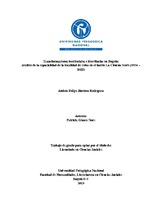Transformaciones territoriales e identitarias en Bogotá: análisis de la espacialidad de la localidad de Suba en el barrio La Chucua Norte (1954 – 2022).
Citación
Fecha
2023Autor
Jiménez Rodriguez, Andrés Felipe
Director / Asesor / Tutor
Gómez Nore, Patricia
Palabras claves
Urbanización planetaria
Muysca
Transformaciones territoriales
Territorio
Identidad
Indígenas - Campesinos
Urbanización informal
Davis, M. (2006). Planeta de ciudades.
Keyword
Planetary urbanizationMuysca
Territorial transformations
Territory
Identity
Indigenous - Peasants
Informal urbanization
Metadatos
Mostrar el registro completo del ítemResumen
El trabajo se propone abordar el territorio de Suba, el cual la comunidad Muysca eligió, por su riqueza tanto en flora, fauna y cuerpos de agua que contiene; la población Muysca después de enfrentar diversos sucesos históricos perdió la mayoría de sus territorios y prácticamente quedan comunidades asentadas y fragmentadas territorialmente alrededor de lo que actualmente son algunas UPZ en Suba, sin embargo estas comunidades se aúnan en lo univoco: recuperar lo históricamente suyo en la lucha por la perseveración de lo que el capitalismo les quiere seguir arrancando; en el último siglo se darán nuevos mercados en este territorio, donde el capital irá dando forma al paisaje generando un nuevo valor de uso del suelo.
De esta manera se pretende identificar y destacar cuales fueron los agentes transformadores de la ciudad de Bogotá, desde las diferentes tendencias investigativas en diferentes periodos tales como la modernización, las perspectivas de centro periferia, la teoría de la dependencia y la marginalidad y los desarrollos recientes en términos del modelo neoliberal donde la teoría de la urbanización planetaria dará interesantes postulados para abordar la problemática y poder analizar las transformaciones que han modificado las características territoriales e identitarias del territorio La Chucua Norte
Asimismo, mediante las herramientas propias de la metodología cualitativa se hace uso de la tradición oral de la comunidad, donde se debela que en la memoria y en el territorio están presentes los diversos cambios, sin embargo, la temporalidad que tiene un peso expreso en la voz de los que participaron en este trabajo investigativo, costándole solo al menos 10 años para normalizar que los terrenos que aún quedaban sin construir estuvieran destinados para esto. Esta normalización del desarrollo urbano ha transgredido a la mayoría de la población, hoy en día las edificaciones verticales dentro de los barrios que en un inicio fueron informales y de orden horizontal, se ven como un progreso en el grueso de la comunidad, pero hay quienes han venido trabajando en la recuperación del territorio y en mostrar las consecuencias que traen estos procesos de construcción de gran escala, y se evidencia que el capitalismo funciona a y actúa a escalas globales, no obstante, precisamente, lo que devela esta postura de globalización es una producción cualitativamente nueva, trasciende, precisamente dominios territoriales que eran relegados al análisis urbano y que une circuitos comerciales y financieros que a la vez reproducen el capital productivo industrial
Abstract
This document proposes to address the territory of Suba, which the Muysca community chose, for its richness in flora, fauna and water bodies that it contains; the Muysca population after facing various historical events lost most of their territories and practically remain settled and fragmented communities territorially around what are currently some UPZ in Suba, however these communities are united in the univocal: to recover what is historically theirs in the struggle for the perseverance of what capitalism wants to continue tearing away from them; in the last century new markets will be given in this territory, where capital will be shaping the landscape generating a new value of land use.
In this way it is intended to identify and highlight which were the transforming agents of the city of Bogota, from the different research trends in different periods such as modernization, the perspectives of center-periphery, the theory of dependence and marginality and recent developments in terms of the neoliberal model where the theory of planetary urbanization will give interesting postulates to address the problem and to analyze the transformations that have changed the territorial and identity characteristics of the territory of La Chucua Norte.
Likewise, by means of the tools of the qualitative methodology, use is made of the oral tradition of the community, where it is shown that in the memory and in the territory the diverse changes are present, however, the temporality that has an express weight in the voice of those who participated in this investigative work, costing only at least 10 years to normalize that the lands that were still unbuilt were destined for this. This normalization of urban development has transgressed the majority of the population, today the vertical buildings within the neighborhoods that were initially informal and horizontal, are seen as progress in the bulk of the community, but there are those who have been working on the recovery of the territory and to show the consequences of these large-scale construction processes, and it is evident that capitalism works and acts at global scales, however, precisely what this globalization posture reveals is a qualitatively new production, it transcends precisely territorial domains that were relegated to urban analysis and that unites commercial and financial circuits that at the same time reproduce the industrial productive capital.
Editorial
Universidad Pedagógica Nacional
Programa académico
Licenciatura en Ciencias Sociales

